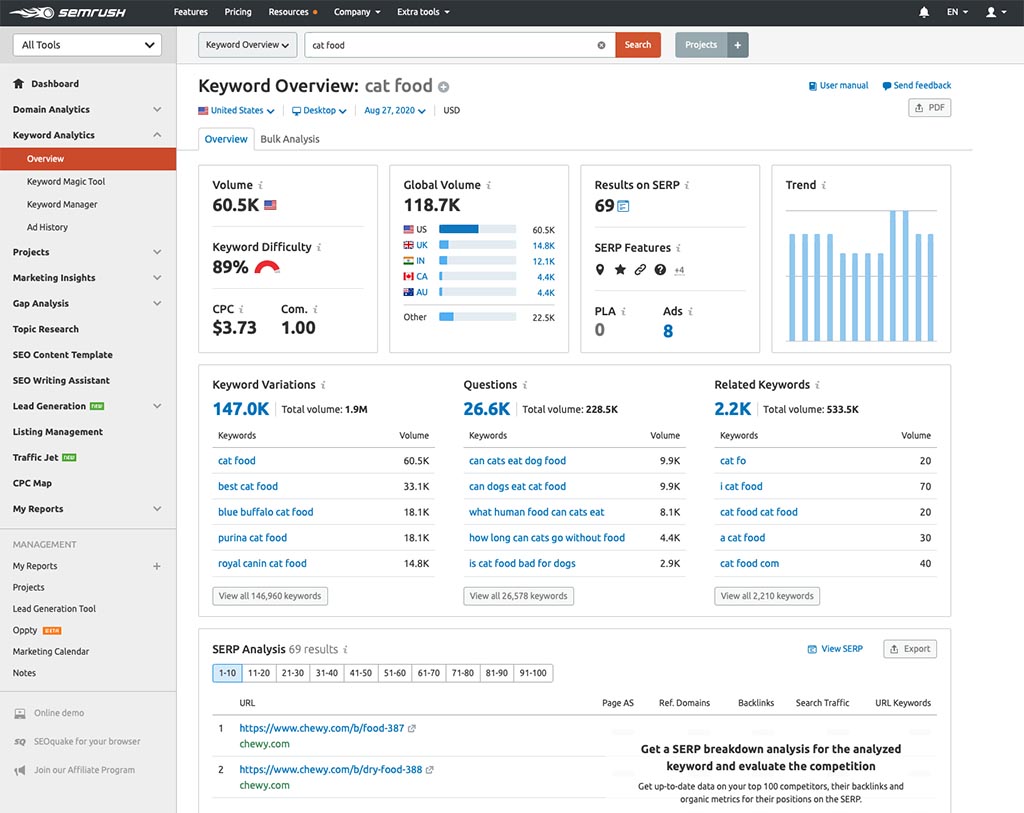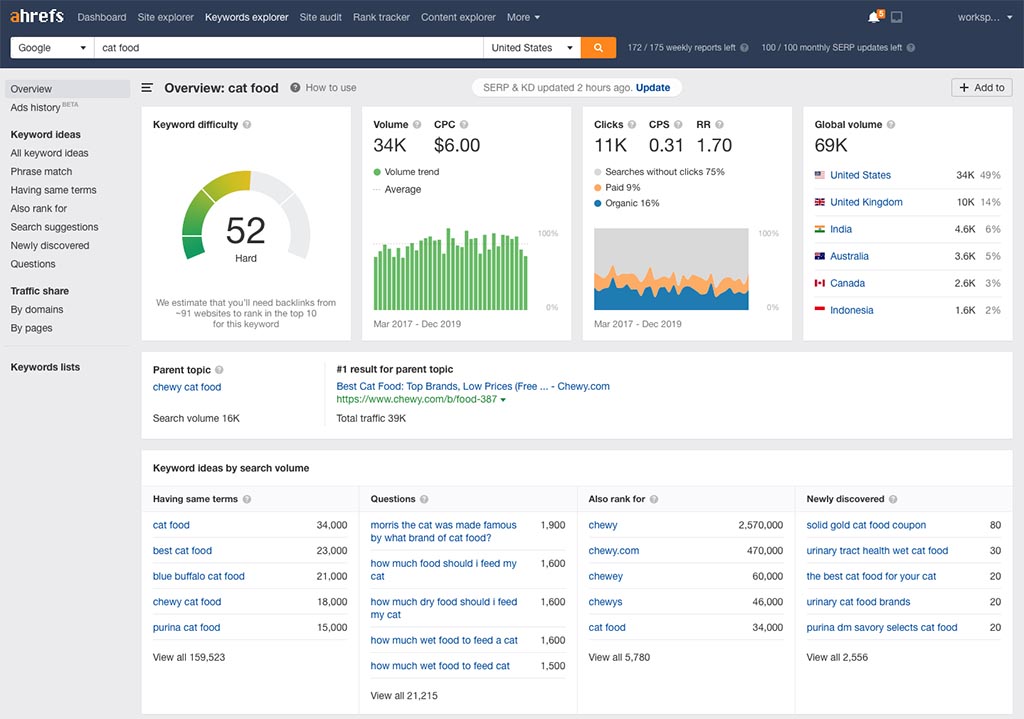I get it. I totally understand the feeling of wanting to spend as little money as possible when building a website or a blog. However, there are some tools worth paying for, and SEMrush is one of them.
It has completely transformed the growth trajectory of my websites (in a good way), and it continues to pay for itself month after month with increased traffic and revenue across my entire portfolio of 8 websites.
How accurate is SEMrush? Is the data that it provides actually useful? Well, based on the success that I’m seeing on my own websites, I’d say: heck yes it is!
This article is for the doubters and haters. There are many people out there who feel that paying for a keyword research tool (at any price) is foolish.
While I don’t disagree that you could get by using free tools, I know for a fact that I wouldn’t be as nearly as successful as I am now without creating a content strategy around the data that SEMrush provides.
How accurate is SEM rush? A detailed look at it’s accuracy in all of the most important categories:
SEMrush provides a lot of data. Some of it useful, some of it not so much. What I find incredibly useful and helpful may not be that important to you (and vice versa).
However, the bottom line is that it spits out a ton of good information which you can use to help you grow your online business faster. Much faster than you could if you were going at it alone.

Let’s take a look at all of the different types of information that SEMrush provides. I’ll give you my own personal accuracy analysis based on what I’m seeing as I use SEMrush on a daily basis.
| Please note: some of the links in this article may be affiliate links. This means that I will get paid a commission if you buy something or take an action after clicking one of them. |
Keyword volume
This is the metric that estimates how much monthly traffic a specific keyword is getting. When you do a search for a keyword in SEMrush, the very first piece of data you’ll see for it is the number which indicates overall volume.
In my experience, it’s slightly on the low side. That doesn’t mean that every keyword volume number it displays is low. It just means that (on average) I’m finding that their volume estimates seem to be lower compared to what Google Analytics is showing.
Some keyword volume estimates are high. Some are low. But on average, I’d say that the estimates are 10 to 15% lower than what you’ll expect in actuality.
Keyword difficulty
This is a really important one for me, and it’s one of the first things that I look at when evaluating a specific keyword. After all, a keyword’s search volume could be 20,000 a month, but it doesn’t matter if it’s ultra competitive and I’ll know that I could never rank for it.
Compared to ahrefs, I find SEMrush’s keyword difficulty score to be a bit aggressive. They rank the difficulty of a keyword from 1 to 100, with 100 being the most difficult. However, in my experience, most of the keywords that I’ve ever decided to go after I’ve had difficulty scores ranging from 70 to 90.
Keywords with a difficulty score of 70 ranked fairly easily on my websites with low domain authority. The keywords that were ranked at 90 were obviously more difficult to rank for. But it’s not impossible (nor difficult) to get on page 2 of the search results for one of those bad boys.
CPC (cost per click)
Remember what I was just saying about some metrics not being very important to me? Well, CPC is one of them. Even though I don’t put much weight on it when deciding to go after a keyword or not, that’s not to say that it doesn’t have any value at all.
For example, if I see that the CPC of any given keyword is high, it tells me that it’s worth going after because advertisers are paying lots of money to promote their content which features that same keyword. In other words, it has high commercial value.
Just for kicks, I did a little experiment last week where I attempted to purchase Google AdWords ads for a small collection of keywords that I found using SEMrush. I found that SEMrush was fairly accurate in its CPC estimates. I’m not exactly sure how they’re pulling such accurate data, but they aren’t too far off.
Competitive analysis
Admit it. Spying on others and seeing what they’re up to is fun, and SEMrush makes it incredibly easy to do. There are a plethora of ways to find out who your competition is using SEMrush, and my favorite (and easiest) way is to let it do that discovery on its own.

SEMush can determine who your competitors are with fairly high accuracy (simply based on the keywords you’re trying to rank for). The competitive analysis tool is extremely helpful to determine not only what keywords they rank for and how much traffic they get, but also to find out where their backlinks are coming from.
The list of websites that SEMrush determines to be my competitors are is fairly accurate.
Sure, they sometimes inform me that my main competitor is the New York Times (it isn’t), but for the most part, their competitive intelligence is extremely helpful and useful. I’ve actually discovered a plethora of other competing websites just like mine but I had no idea existed.
As a matter fact, that’s another good reason to be using SEM rush. It’ll help you find an evaluate your competition even before you get started!
Backlink profiles
Although there’s nothing overly difficult about simply listing out a list of backlinks, the SEMrush Backlink Audit tool is impressive. Additionally, I have noticed that both SEMrush and ahrefs shows me a different number backlinks to the same website.
Because I trust Google more, I cross-reference most of that data using the Google Search Console. Long story short: SEMrush usually shows my number of backlinks to be similar to what the Google Search Console is showing. Take that for what it’s worth since there’s really no way of proving which tool is correct. Heck, even Google could be way off…
Speaking of backlinks, one of the really nice backlink metrics that SEMrush provides that ahrefs doesn’t is a quality score on every keyword. In other words, it will tell you the spam probability of any given backlink to your website. From there, it will give you the option to disavow it or leave it alone. That’s pretty cool.
Keyword ranking
Keeping tabs of how well your website ranks for specific keywords isn’t all that complicated. However, it’s one of the first things that people generally ask when they want to know how accurate SEMrush is.
When it comes to comparing SEMrush and afrefs, they both show this data identically. But there is one small difference: SEMrush’s database is updated daily, whereas ahrefs only updates their data once a week (if you’re on the basic plan). Once a week is a long time to wait if you are a busy contact creator such as myself.
Keyword discovery
Keyword discovery is my favorite part of SEMrush. The primary reason why I subscribe to their service is to quickly obtain a list of possible keyword ideas that I had never thought of before. And you know what? Their Keyword Magic tool does this magnificently.
Simply typing in a keyword in the SEMrush will result in an endless stream of possible keywords related to that query. You can sort that list by things like search volume, difficulty score, questions, similar topics, etc. It’s an amazing tool, and it makes the cost of a subscription worth every penny.

In terms of overall accuracy of this list, it does fairly well in my opinion. Compared to ahrefs, SEMrush will typically generate a longer list of keyword possibilities for any given term. This leads me to believe that they have a larger database of keywords than those other guys, and that’s why it’s the first place I go to when doing keyword discovery.
That being said, sometimes ahrefs will provide a longer list of keyword possibilities. That’s why it’s beneficial to use both of these tools if you can.
How to get the most accurate data possible from SEMrush
Trust. But verify. Those are the famous words of Ronald Reagan, but they absolutely do apply to keyword research as well. More often than not, I’ll make an effort to cross reference the data that I’m seeing in SEMrush with other platforms.
1. Compare it against the data against ahrefs
One of the ways I’ve been able to determine whether or not SEMrush is accurate is to compare it against the data that I get in ahrefs. Yes, I also use ahrefs from time to time, and it’s a pretty good alternative to SEMrush if you’re looking for something just a little bit different.


The bottom line is that both SEMrush and ahrefs are providing mostly the same data. There isn’t that much difference – which is just added assurance that the data it’s providing is mostly accurate. The only reason why you would choose one over the other is because you prefer the way that either prevents presents the information. Everyone is different, and only you can decide which is better for you.
2. Veryify with Google
Another way to cross reference the data you get from SEMrush is to check and see what Google has to say about it. For example, if you’re doubting the competitive score of a particular keyword that you found using SEMrush, pop on over to Google and do a search for that exact same keyword.
What you see on the first page of the search results will tell you everything. If all you’re seeing is links to ultra high authority domains, you don’t really stand a chance of ranking well. However, if all you’re seeing are links to forums and small websites you’ve never heard of before, chances are the competitiveness of that keyword is low and you’ll have a high probability of ranking for that keyword.
The bottom line
How accurate is SEMrush when comparing the data against other platforms? Pretty good actually. It’s not perfect, as no keyword research tool can ever be. But no matter what, I’ve always found the data it provided to be more helpful than hurtful.




